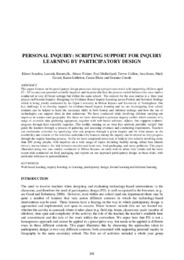Personal inquiry: scripting support for inquiry learning by participatory design

View/
Date
2010Author
Scanlon, Eileen
Kerawalla, Lucinda
Twiner, Alison
Mulholland, Paul
Collins, Trevor
Jones, Ann
Gaved, Mark
Littleton, Karen
Blake, Canan
Conole, Grainne
Metadata
Show full item recordAbstract
This paper focuses on the participatory design processes during a project concerned with supporting children aged 12 – 15 to carry out personal scientific inquiries and in particular how the process varied between two case studies conducted in very different settings but within the same school. The context for the case studies is a three year project on Personal Inquiry: Designing for Evidence-Based Inquiry Learning across Formal and Informal Settings which is being jointly conducted by the Open University in Milton Keynes and University of Nottingham. Our key challenge is to develop support for evidence-based inquiry learning and we are investigating how school students can be helped to learn the necessary skills in both formal and informal settings and how the use of technologies can support them in that endeavour. We have conducted trials involving children carrying out inquiries in science and geography. For these we have developed a personal inquiry toolkit which consists of a range of scientific data gathering equipment, together with web-based software, nQuire, that supports students’ progress through their scientific inquiries. This toolkit, running on an Asus Eee netbook provides ‘scripts’ that guide the learners through a process of gathering and assessing evidence and conducting experiments. Teachers can orchestrate activities by specifying who can progress through a given inquiry and by what means as the availability and content of the activities undertaken by learners during the inquiry can be altered as they progress through the inquiry learning process. So far we have completed seven sets of trials in two schools involving more than 200 young people, with inquiries on a wide range of topics including healthy eating, urban heat islands (twice), microclimates, the link between exercise and heart rate, food packaging, and noise pollution. This paper illustrated using two case studies conducted in Milton Keynes, an early trial on urban heat islands and the most recent trial conducted on food packaging and reports on our approach participatory design in these trials, with particular reference to personalisation.